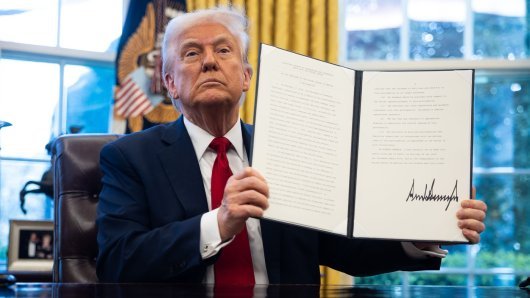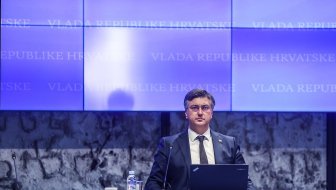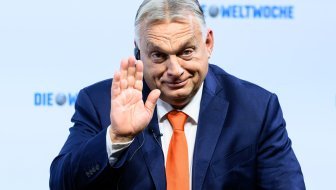Serbian Radical Party leader Vojislav Seselj and his followers left behind in Croatia and Bosnia and Herzegovina a trail of crime in their attempt to ethnically cleanse parts of those two countries and annexe them to one Serbian state, prosecutor Lisa Biersay said at the International Criminal Tribunal for the former Yugoslavia (ICTY) in The Hague on Tuesday.
Where Seselj's men went, crimes were committed, where the Chetnik leaders went, crimes were committed, she said on the second day of closing arguments in Seselj's trial.
The fact that he sent his volunteers, who numbered 30,000, to Croatia and Bosnia refutes his claim that he was merely a political figure, the prosecutor said, citing evidence linking Seselj's volunteers to a series of crimes, from the killing of Croatian police in Borovo Selo to the Ovcara atrocity.
Seselj instigated not only his followers, who were organised like a Chetnik army, but others as well, through his inflammatory speeches, to commit crimes. The court heard his speeches from Vukovar to Vocin in Croatia in which he called for "expelling and killing the Ustasha because this is Serbian territory."
Although he was not the commander of his volunteers, as a "Chetnik duke" he exerted great influence over them, sending them to specific locations, appointing commanders and bestowing decorations and ranks.
From the beginning of the persecution campaign, the accused was fully aware that he was making a significant contribution to the joint criminal enterprise, he knew the influence he had based on the reaction of the crowds, so he never stopped using his hate propaganda, not even today, Biersay said, adding that by spreading hatred, Seselj tirelessly promoted the formation of ethnically cleansed parts of Croatia and Bosnia.
Seselj instigated crimes, which has been proved beyond reasonable doubt and the time has come for him to answer for them, she said.
In its closing arguments, the prosecution described the network of Serb units which comprised local forces, volunteers - including Seselj's, and troops sent by Serbia and the Yugoslav People's Army (JNA), and how they jointly worked on the ethnic cleansing of Croatia and Bosnia.
Prosecutor Ulrich Muessemeyer said the goal of the joint criminal enterprise was carried out according to the same pattern - arming and training the local population, sending paramilitary units from Serbia and taking over power, after which the Serb troops committed crimes which included murder, detention, abuse, the destruction of Catholic churches in Croatia and mosques and Catholic churches in Bosnia.
He said the pattern was first used in Vukovar and Vocin, Croatia, and then in Bijeljina, Bosanski Samac and Brcko in Bosnia.
Seselj was accused of involvement in a joint criminal enterprise aimed at ethnically cleansing parts of Croatia, Bosnia, and the Serbian province of Vojvodina and annexing them to a single Serbian state. Between 1991 and 1993, Seselj made inflammatory speeches in which he instigated crimes and sent volunteers to Croatia and Bosnia to commit them.
Prosecutor Rachel Hochhauser said Serbian forces, including Seselj's men, mercilessly destroyed life in Vukovar because the participants in the joint criminal enterprise, including the accused, thought that the eastern Croatian town was strategically important for the realisation of their objective.
She recalled Seselj saying that for him, Vukovar was Serbia just as Belgrade was and describing it as the biggest Ustasha stronghold. The court heard a recording of the JNA's commander in Vukovar, Veselin Sljivancanin, talking about "great cooperation" with Seselj's men in "breaking" the Croatian troops.
Seselj visited the front line in Vukovar and his speeches in the city area were full of hatred and violence, influencing anyone who heard them and not only his volunteers, Hochhauser said, adding that the prosecution produced evidence of his volunteers openly killing unarmed Croats in the Vukovar area because they did not have the time to take them to the Velepromet detention centre.
They committed those crimes without any fear that Seselj would punish them, the prosecutor said, reminding the trial chamber that Seselj's volunteers, led by Milan Lancuzanin, took part in torture and murder at Ovcara farm outside Vukovar.
The accused is linked to the perpetrators of those crimes and the effort he made in his final brief to distance himself from them is remarkable, but his claims lack credibility, she said.


































